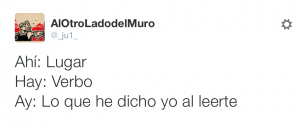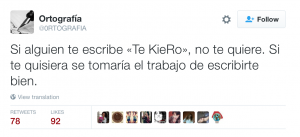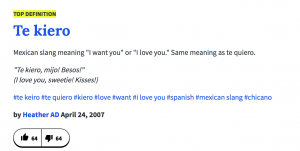Sebba (2007) argues that orthography emerges as a speaker’s need to have a reference point, the norm, for writing, because variation cannot be normed, but fight against, so the user could be clear which code has to be used in each situation.
In this frame, violations to orthography norms have been seen as meaning marks, where identity plays a central role. However, Sebba writes that orthography norms are social norms, not language norms per se. And this issue is well shown in social networks, where users express their thoughts, opinions or whatever they want to share, most of the times without taking care of the orthography, or making innovations about it, in order to be original or just to get more followers.
So we can read many posts like this, where the user presupposes that writing skills should not be a problem for anyone.

That is why, at the same time, many profiles in social networks have emerged as orthography guardians, and their mission is to teach everybody how to write correctly.

The curious thing is they use emotional and moral arguments to convince people to learn the good writing.

Debbie Cameron (1991) calls this phenomenon “verbal hygiene”, and the main support is the moral panic, I mean, people want to be accepted in a social circle, so they have to behave in an expected way. This is the success key for these profiles in social networks, because they have many insecure followers that need to learn what they consider they do not master about writing.
The opposite side is represented by users that do not care about norms and they use these deviations as an identity mark. Many teenagers use this particular code to texting, twitting, and Facebook; however their teachers argue they do that because they have not learned to write correctly. But is this the reason?
Society has found many scenarios to regulate people’s behavior, writing is one and orthography is the best tool. To fight against it, do people know it perfectly in order to violate it?
As a plus, I found this in urban dictionary.com. Is it part of a slang?





In response to Rocío’s comment “(…) moral arguments to convince people to learn the good writing”– I have just watched a video about a Lithuanian scientist who has made a discovery in the field of targeted genome editing. To present his idea he used the metaphor of “bad” spelling, likening it to a mutated gene, which can be “corrected”. The video is in Lithuanian, but here is what he says: “(1:45) Let’s imagine that DNA is a sentence and that the genes are words in that sentence. If there happens to be a mistake in a word, it’s meaning changes. If there happens to be a mistake in a gene, its function changes, which is a common reason for genetic disorders. We see right away that this is a wrong letter [shows a DNA chain with a sentence above, misspelled letter in red]. With the help of this tool we cut out the wrong letter – or the wrong gene- and replace it with the right one.”
Spelling rules are so ingrained in our psyche that they can be easily likened to something biological and the metaphor of “bad” spelling can be extended to fields that have nothing to do with language.
Link to the video “Genų žirklės” below (start at 1:45), hope it works!
https://www.facebook.com/VilniusUniversity/videos/1292824607435155/